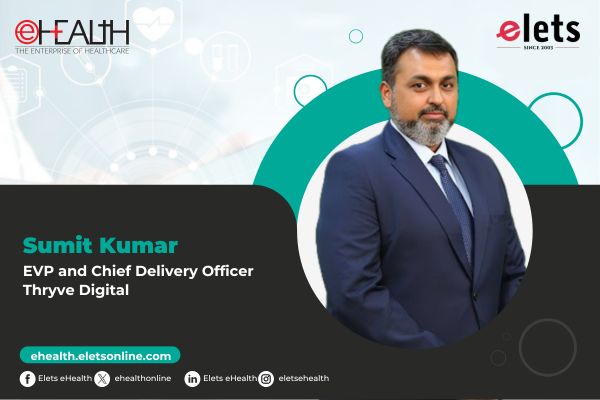
The market for self-testing kits is on the rise owing to an increase in the level of health awareness and the need for quality preventive healthcare. The session explored the trends, challenges, and opportunities of the Rapid Diagnostics Kits Market at the 4th Elets Diagnostic Leadership Summit. Edited excerpts:
Dr Hari Om Sharma, Laboratory Director, Laboratory Services, Sir T Hospital moderated the session and communicated, “The current market of rapid diagnostic kits is somewhere around $45 million, which is going to double in the coming years, shows this segment has a very big prospect in terms of business. It is proceeding to make a big discrepancy in the rapid response though reliable and result in a kind of approach not only to the hospital near the bedside for patient care but to many individuals staying in rural areas as well. They can get the similar quality of diagnostic services as their counterparts in the cities and metros.”

It is the diagnosis of Covid-19 that made it possible due to rapid diagnostics kits. These kits helped people in getting rapid COVID tests done and also added value to the overall diagnostic industry.

He added, laboratories are the front liners and they are as good and influential as the clinicians in the healthcare delivery system and the management. The flawless rapid diagnostic point of care test used in resource-limited settings shall fulfill the criteria by permitting a quick clinical decision that can be used by healthcare workers and also by non-professionals and in terms of finance it must be effective and cost-efficient.

Dr. Manoj Chugh, Vice President – R&D (Reagents), Transasia Bio-Medicals Ltd stated that “The rapid diagnostic testing market is at a nascent stage and needs certain policy interventions to propel the growth of this sector. The government needs to devise a strong monitoring mechanism to control the mushrooming of small manufacturers who do not maintain quality standards. Indian manufacturers need to be incentivized to increase indigenous production. Importantly, the approval process needs to be accelerated to ensure timely availability of these kits,”.

Dr Varsha Vadera, Head – Laboratory Medicine & Advanced Diagnostics, Kokilaben Dhirubhai Ambani Hospital stated, “The value of rapid testing kits were seen during the COVID pandemic when thousands of people used these for preliminary testing. Also, with a growing population, the need for such tests have further increased.”
She added that the aging population is increasing in our country. Medical health care wants to use rapid diagnostic tests as preliminary screening tests so that the patient gets treatment immediately and they do not waste time on doing various other tests. The health care clinics, as well as hospitals, are expanding in number and they use these tests for various reasons but we have just enumerated and as a result there is an opportunity for growth. There is an aging population, therefore, there are lots of chronic diseases and also there’s an increase in infections. She also said that rural areas do not have enough facilities but they’ll also be addressed with rapid diagnostic kits.
Dr Nita Munshi, Consultant & Advisor, Laboratory & Quality Assurance, Ruby Hall Hospital communicated, “As COVID is reducing and not many people are taking rapid testing for COVID now, other rapid tests will still be significant in the market. The scope of growth is where quick diagnosis through rapid testing kits is offered to the people residing in rural areas, thus, connecting the citizens at the grassroots level with quality diagnostic services.”
She added that, “We don’t know what other viruses and diseases will be coming our way and that will promote the industry to come out with newer rapid diagnostic kits.
Dr Shaloo Kapoor, Chief Pathologist & Sr. DGM, SRL, Fortis Escorts Heart Institute, Delhi conveyed, “The fastest-growing segment in the coming years would be Molecular Diagnosis. Smartphone-based testing and use of smart wearables will see huge growth in the times to come as the use of technology is growing in the field of diagnostics.”
Technologies and the research which is going on in the lab will be the driving force as multiple parameters that can be observed and tested on the same chip. While in normal technologies there will be innovations and mobile technology will be one of the driving forces for point-of-care testing.
The challenges are basically not technological but challenges are inherent within the healthcare system as such and these challenges can be divided at the level of the device, the level of patients, the level of healthcare providers as well as at the level of the healthcare system. She added that digitization is there but awareness about data is lacking because of attrition of the nursing staff.
Dr Monika Shashank, AVP Operations and Lab Director, Vimta Laboratories Ltd averred that multi-diagnostic will take place in faster diagnosis together with AI and machine learning as these are the two tools which were rapidly being used in Covid-19 testing and the people have come up to the experience and wisdom how it can be helpful in defining the algorithm based testing. “Diagnostics have evolved dramatically in the COVID times when the turnout time was brought down from 6 hrs to less than an hour. Research is ongoing on using oral fluids like saliva or urine for most screening tests to make it convenient for people & prevent extraction of samples like blood or other internal body fluids.” She added that decentralization definitely not only lessens the turnaround time it declines the initial default rates, it improves communication and it requires a lesser reliance on logistics as well. She further stated that diagnostics is evolving and we are having molecular testing evolving to give various tests in less than an hour’s time. Also, centralized laboratories are also working towards giving a better turnaround time maintaining the accuracy of reporting.
Dr Rohit Chawla, Professor, Department of Microbiology Maulana Azad Medical College & Associated Hospitals stressed on the need for improving the quality of rapid tests. He averred that multiplexing is an area of infectious diseases syndromes that need to be examined, especially by the manufacturers. He stated that there are numerous pathogens that can cause a similar kind of disease manifestation which can detect a specific pathogen causing that particular disease. Post detection, one can narrow down as far as the treatment is concerned and the antibiotic stewardship would be helped by this particular approach and unnecessary treatment and development of antimicrobial resistance can also be avoided.
He further added that there is a need to have both internal quality control measures as well as external quality assessments. “We ought to have a robust system wherein the external quality assessment for a lab is performed as POCT and that would have one more layer of quality attached to it,” shared Dr Chawla.
Be a part of Elets Collaborative Initiatives. Join Us for Upcoming Events and explore business opportunities. Like us on Facebook , connect with us on LinkedIn and follow us on Twitter , Instagram.
"Exciting news! Elets technomedia is now on WhatsApp Channels Subscribe today by clicking the link and stay updated with the latest insights!" Click here!
















